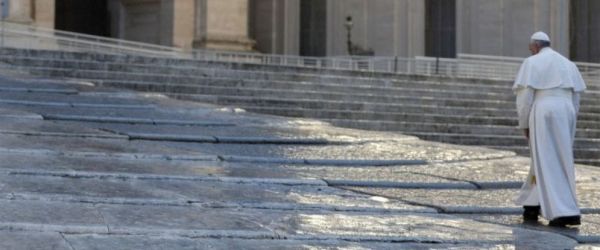Pope Francis, in his homily at the Mass in the Casa Santa Marta, invites us to reflect on the hypocrisy of the righteous, who live Christianity "as a social habit", do not bring Jesus into their daily lives and thus expel him from their hearts. If we do this "we are Christians, but we live like pagans".
We, who are born into a Christian society, risk living Christianity "as a social habit", formally, with "the hypocrisy of the righteous", who are "afraid to let themselves be loved". And when Mass is over, we leave Jesus in church, "he does not come home with us", in daily life. Woe to us, so we drive Jesus out of our hearts: "We are Christians, but we live like pagans". Pope Francis invites everyone to an examination of conscience, in the homily of the morning Mass celebrated at Casa Santa Marta, commenting on the Gospel of St Luke and Jesus' rebuke to the people of Bethsaida, Chorazìn and Capernaum, who did not believe in him despite the miracles.
Jesus weeps for those who are incapable of love
Jesus "is grieved to be rejected", Francis explains, while pagan cities like Tyre and Sidon, seeing his miracles "surely would have believed". And he weeps, "because these people had not been able to love", while He "wanted to reach all hearts, with a message that was not a dictatorial message, but was a message of love".
We, born Christians, who forget Jesus
Instead of the inhabitants of the three cities, put us, put me, continued the Pope. "I who have received so much from the Lord, I was born in a Christian society, I have come to know Jesus Christ, I have come to know salvation," I was educated in the faith. And very easily I forget about Jesus. Then instead 'we hear news of other people who immediately hear the announcement of Jesus, convert and follow him'. But we, comments the Pontiff, are 'used to it'.
And this habit hurts us, because we reduce the Gospel to a social, sociological fact, and not to a personal relationship with Jesus. Jesus speaks to me, he speaks to you, he speaks to each one of us. Jesus' sermon is for each and every one of us. How is it that those pagans who, as soon as they hear Jesus' sermon, go with him, and I, who was born, here, in a Christian society, get used to it, and Christianity is like a social habit, a garment that I put on and then leave? And Jesus weeps, over each one of us when we live Christianity formally, not really.
The hypocrisy of the righteous is fear of letting oneself be loved
If we do this, Pope Francis clarifies, we are a little hypocritical, with the hypocrisy of the righteous.
There is the hypocrisy of sinners, but the hypocrisy of the righteous is the fear of Jesus' love, the fear of letting oneself be loved. And actually, when we do this, we are trying to manage our relationship with Jesus. "Yes, I go to Mass but you stay in the church I then go home".
"And Jesus doesn't go home with us: in the family, in the education of the children, in the school, in the neighbourhood..."
We pretend to have Jesus, but we cast him out
So Jesus remains there in the Church, bitterly comments Francis, "Either he remains in the crucifix or the little picture".
Today can be a day of examination of conscience for us, with this refrain: "Woe to you, woe to you", because I have given you so much, I have given myself, I have chosen you to be a Christian, to be a Christian, and you prefer a half-and-half life, a superficial life: a little yes of Christianity and holy water but nothing more. In fact, when we live this Christian hypocrisy, what we do is drive Jesus out of our hearts. We pretend to have him, but we kick him out. "We are Christians, proud to be Christians", but we live like pagans.
Prayer: you have given me much, I am ungrateful
Each one of us, the Pope concludes, thinks: "Am I Corazìn? Am I Bethsaida? Am I Capernaum?" And if Jesus weeps, ask for the grace to weep also. With this prayer: "Lord, you have given me so much. My heart is so hard that it will not let you in. I have sinned in ingratitude, I am ungrateful." "And we ask the Holy Spirit to open wide the doors of our hearts, so that Jesus may enter, so that we may not only hear Jesus," but hear his message of salvation and "give thanks for so many good things he has done for each of us."
[Pope Francis, s. Marta; Alessandro Di Bussolo (ed.)
https://www.vaticannews.va/it/papa-francesco/messa-santa-marta/2018-10/papa-francesco-omelia-messa-santa-marta-guai-cristiani-ipocriti.html]












